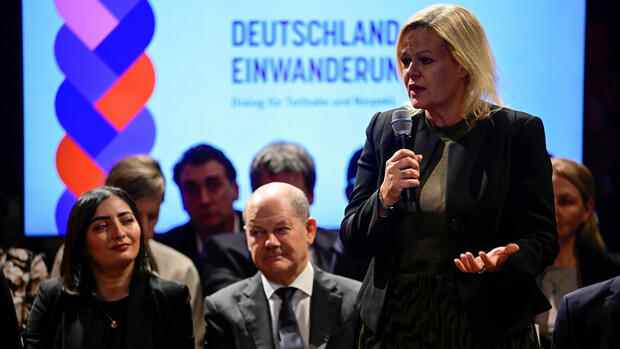The minister’s plans to make naturalization easier and to shorten procedures are at the center of a heated political debate.
(Photo: Reuters)
Berlin Nancy Faeser gives no indication of the stir she’s stirred up with her foray into citizenship law. The Federal Minister of the Interior is visiting the Festsaal Kreuzberg in Berlin together with Federal Chancellor Olaf Scholz (SPD). It’s Monday and it’s the start of a series of talks entitled “Germany. Immigration Country: Dialogue for Participation and Respect”.
Of course, Faeser’s moderator wants to know how she feels about the heated debate – especially the harsh criticism of her liberal coalition partner on her plans to lower the legal hurdles for naturalization. The minister smiles and replies succinctly that the reservations from the FDP are not uniform. She discussed her plans with the domestic politicians and “worked them out together”.
But even from this corner, the critical tones prevail. Even before the planned immigration law has been passed, the Federal Ministry of the Interior will present a draft law on nationality law, says the FDP domestic politician and parliamentary group leader Konstantin Kuhle of the “Welt”. That is “the wrong order”. “First we have to agree on who should come to our country,” demands Kuhle. “After that, we can move on to the issue of easier access to citizenship.”
Above all, liberals want better enforcement of deportations
Such statements are met with incomprehension by Faeser’s people in the Federal Ministry of the Interior, since the traffic light coalition agreed on a “new beginning in migration and integration policy” in its coalition agreement a year ago. Since then, the minister has been tirelessly driving the issues forward and will be presenting several draft laws in succession this autumn.
Top jobs of the day
Find the best jobs now and
be notified by email.
It is not surprising that the opposition does not agree with this. The left does not find the planned reforms courageous enough, for example in the case of the right of residence for those who have been tolerated. When it comes to migration, the AfD usually only reflexively thinks of “deportation”. The Union believes that there must be a stronger distinction between immigrants who work and learn German and those who don’t.
>> Also read here: Faeser plans “turbo naturalization” for foreigners
Above all, the FDP finds that aspects that are important to them are neglected. Above all, the Liberals want better support for labor migration and more support from the federal government in enforcing the obligation to leave the country and deportations. After all: This Wednesday the cabinet is to discuss a key issues paper on immigration into the labor market.
But the FDP has now gotten really stuck on Faeser’s plans for easier naturalization. One of the key changes in the draft, which has not yet been approved by the cabinet, is that in future migrants should generally be able to obtain a German passport after five years instead of eight. In addition, the possibilities for dual nationality are to be expanded.
She has the chancellor’s backing
Faeser’s plans are a matter of the heart. It is important to her personally to simplify the naturalization of people from the so-called guest worker generation, she says. It is also a question of justice for them.
The objections of the FDP, which is stepping on the brakes and wants to link progress in deportations with the implementation of the reform of citizenship law, Faeser has rejected with a banal remark: the facilitated naturalization is part of the coalition agreement.
>> Also read here: Traffic light coalition argues about faster naturalization: “Completely wrong signal”
Is the reference to the coalition agreement alone sufficient? Not necessarily. The FDP also wants to allow multiple citizenships in principle – “albeit with clear rules so that dual citizenships are not always passed on,” emphasizes the FDP interior expert Stephan Thomae. There is therefore still a need for coordination on detailed questions about Faeser’s draft.
What suits Faeser, however, is that Chancellor Scholz is fully behind her. At the event on immigration policy, Scholz left no doubt that the plans of his interior minister and social democratic party friend would be implemented. “Anyone who lives and works here on a permanent basis should also be able to vote and be elected, they should be part of our country with all the rights and duties that go with it,” the Chancellor made unmistakably clear.
Faeser hopes that the modernized citizenship law will come into force next summer. Until then, there are likely to be many more debates on the subject. The FDP will not give up any more than the opposition. At the request of the CDU/CSU parliamentary group, there should be a current hour on the project in the Bundestag this week.
More: 360,000 vacancies – Civil Service Association complains about “cannibalism” among the countries and calls for better pay
